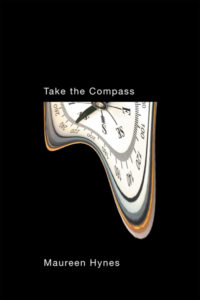 By Megan Nega
By Megan Nega
Take the Compass
by Maureen Hynes
McGill-Queen’s University Press (2023)
Take the Compass is a vivid collection of 58 poems which offer guidance for navigating life’s chaos and complexity. In these poems, Maureen Hynes uncovers meaning everywhere—in memories, dreams, reality, and even in a “silver pillbox of ampersands” on her bedside table (67). Throughout the book, her poetic tone is complex and captivating—both serious and whimsical all at once—and each poem reminds us that like it or not, in life, light and darkness are inextricably intertwined.
Hynes adds an intimate touch to her evocative imagery by frequently using the second person point of view to instruct the reader to act. In “Take the Compass,” Hynes encourages you to “wash your face in fog, / your hands in hopefulness” (3). And in “Before Nightfall,” you are urged to release “the wet laundry of your emotions” and rise to “re-enter the language of high cliffs” (4). This line resonates—I would like to speak the language of the high cliffs, even once.
Hynes’ poetry is both rich and refined. Notice how in “Something Pied Piper-ish,” Hynes juxtaposes sound and image together to create a building tension, then resolution, as man-made sound relaxes into nature:
in the moment
before dusk falls into our hemisphere.
His silver flute summons my cymbals –
we make a great clash that opens
into laughter. The joining ripplesthe way orange lilies spread throughout
my untended garden, a tubular under-
ground grasping. That rough scent. Weed-ish,
but with a ragged beauty. A clamour that takes
the nerves right out of me. (8)
Take the Compass is divided into six distinct sections which are unified by the theme of exploration. Each poem invites us on a voyage of discovery, and throughout the journey we traverse through time and many seasons. Yet, there’s a sense of timelessness to her words. Her writing exists in a liminal space where, always, “it was early, it was late, it was not yet dawn” (66).
Within each time-period, Hynes grapples with feelings of worry, sorrow, and loneliness. In “Kind of Blue” Hynes recalls how “Blue poured over the entire / world” (9) during the COVID-19 crisis. And in “Summer Ice” we go farther back, to her childhood, where lives the tragedy of family members falling “through … ice into the chill / inky lake of dementia” (29). As for the future, in “Be Planetary,” Hynes imagines that we may emulate the planets, “live without horizons,” and become frighteningly “distan[t] from companions” (85). The focus on multiple timelines is exemplified in “The Juggler:”
Today was brim-full of intentions, then
emptied out by midafternoon. Tomorrow
will haul in its own disappointments
& spill them onto our doorstep
like a torn mesh bag of birdseed. (45)
But Hynes’ poems also equip us with many tools to combat disapointment, fear, and uncertainty—in “Classic Blue” it is the invasive wildflower, scilla, that every spring “spread[s] a Classic Blue shield against / anguish and fear” (49). And in “For Your Head,” Hynes recommends smearing “a lick of honey on each earlobe to sweeten / whatever you hear” (54). After reading, I too want to armour myself with nature.
This wonderful collection embraces both wistfulness and reality. It doesn’t discriminate between sadness and happiness—it accepts everything as part of the journey. At its core, Take the Compass teaches us that it’s okay to be lost, and that the compass need not always point north.
Megan Nega is poet, writer, and artist from Calgary, Alberta. Her poetry has appeared in the literary magazines FreeFall and New Forum. In her spare time, Megan enjoys visiting the mountains in search of wildflowers, watercolour painting, and sharing her thoughts about all things writerly and literary on her blog, Writer’s Hearth.
